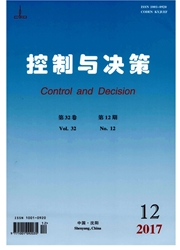

 中文摘要:
中文摘要:
提出一种基于扩展原理的混合证据推理不确定决策模型.通过α截集将同一决策问题中各属性使用的精确数、区间数和模糊数等异构评估信度统一分解为区间结构,采用区间证据推理方法求解各隶属度下的效用区间,并按隶属度次序重组方案效用;化简模糊数质心公式,并用于模糊定量评估的信度计算和方案模糊效用的排序;最后,通过具体实例验证了所提出方法的有效性和可行性.将该方法在算例中的适用情况进行比较和分析,结果表明所提出的方法具有良好的适应性.
 英文摘要:
英文摘要:
An approach called hybrid evidential reasoning is proposed based on the extension principle to deal with multiple attribute decision making under uncertainty. Heterogeneous beliefs, such as crisp value, interval value and fuzzy value, on the same problem are all decomposed into interval value to setup a uniform belief structure. Interval evidential reasoning is used to work out the interval utility of the alternative for each membership degrees, and the utility of each alternative can be assembled in the order of membership degrees. The equation of fuzzy centroid is reduced and used to calculate the belief degree of quantitative fuzzy assessment and rank the fuzzy utility of alternatives. Finally, an example is examined to illustrate the effectiveness and feasibility of the proposed method. Comparing with the application of all these approaches to the example, the results show that the proposed approach is adaptable.
 同期刊论文项目
同期刊论文项目
 同项目期刊论文
同项目期刊论文
 Technical importance ratings in fuzzy QFD by integrating fuzzy normalization and fuzzy weighted aver
Technical importance ratings in fuzzy QFD by integrating fuzzy normalization and fuzzy weighted aver Approaches to determining the relative importance weights for cross-efficiency aggregation in data e
Approaches to determining the relative importance weights for cross-efficiency aggregation in data e A linear goal programming approach to determining the relative importance weights of customer requir
A linear goal programming approach to determining the relative importance weights of customer requir Assessing the relative importance weights of customer requirements using multiple preference formats
Assessing the relative importance weights of customer requirements using multiple preference formats 期刊信息
期刊信息
